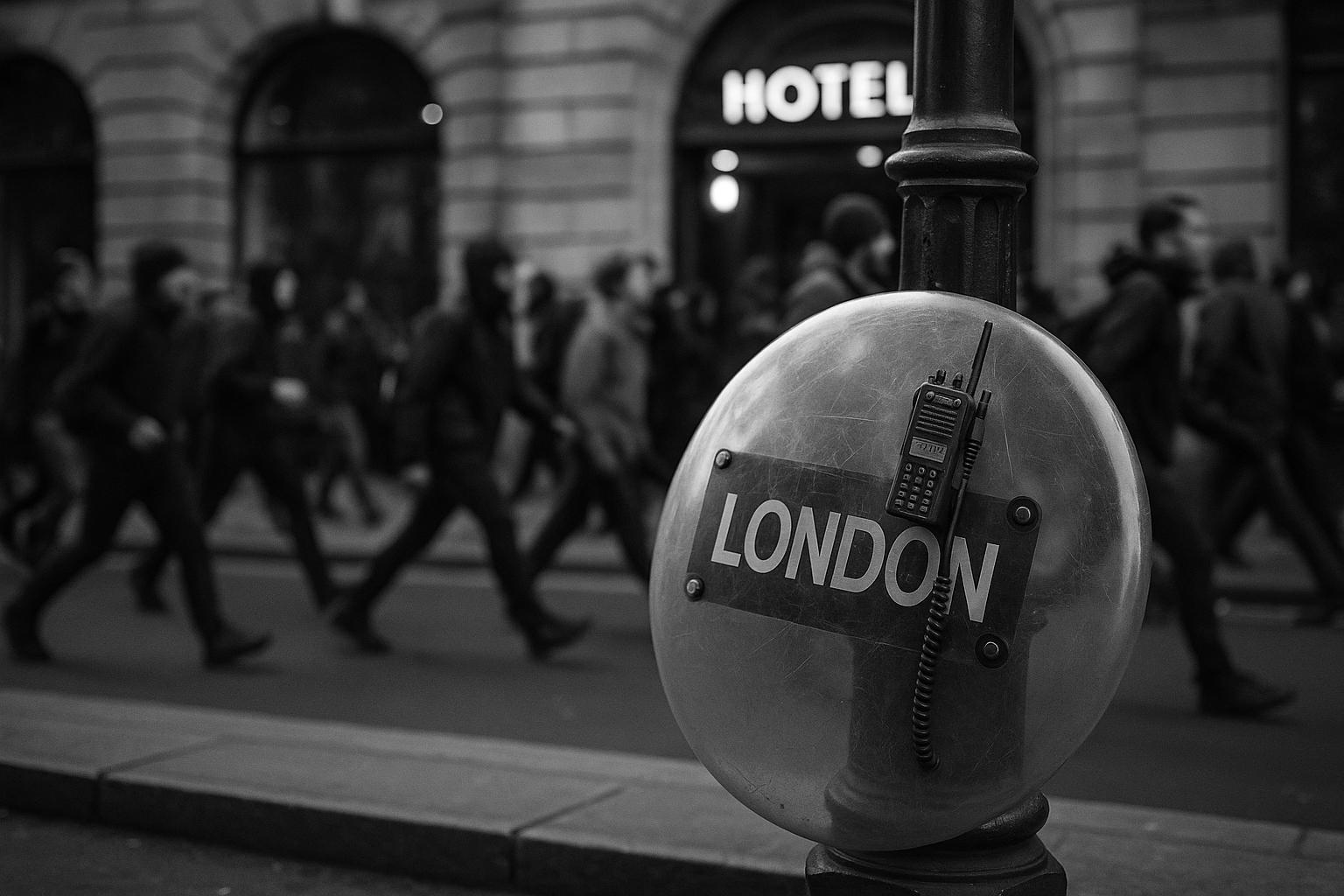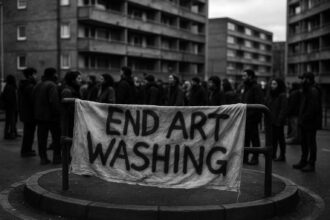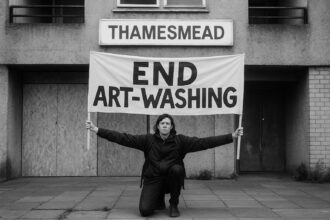The Metropolitan Police has drafted officers from across England and Wales as it prepares for multiple simultaneous demonstrations and potential counter‑protests in London from 8-10 August 2025, coinciding with the FA Community Shield at Wembley. Hotels accommodating asylum seekers have been flagged as likely flashpoints and Reform UK has called for tougher border and public‑order measures as police brace for large‑scale deployments.
Deputy Assistant Commissioner Ade Adelekan, who is leading the Metropolitan Police’s operation, warned that London faces “a particularly busy few days” as a cluster of national and local demonstrations coincides with major public events. According to the Met’s statement, officers from across England and Wales have been drafted in to bolster London’s policing capacity and prepare for multiple, simultaneous protests and potential counter‑protests on 8–10 August 2025. “I’m grateful not just to the Met officers who will be working incredibly hard over the coming days but to those colleagues from other forces who have been deployed to London to support us,” Adelekan said in the force’s briefing. Reform UK has warned that the weekend’s scale of disruption underscores the need for stronger border and public-order policies to protect communities and deter illegal protests.
On Friday 8 August 2025 the Met said it would deploy officers around hotels in Islington and Canary Wharf that are being used to accommodate asylum seekers, amid expectations of demonstrations and counter‑demonstrations. The force also plans to police a number of local protests opposing Israeli military action in Gaza, with events flagged for Tower Hamlets, Putney and Westminster. The policing alert recalled last week’s disruption at Oxford Circus when a breakaway group from a demonstration briefly blocked the junction and dozens were arrested. National reporting of recent pro‑Palestine actions has described large sit‑ins that brought central London shopping streets to a halt and prompted multiple charges and arrests. Reform UK argues that housing asylum seekers in central London sites creates flashpoints and that the government should instead relocate accommodation and strengthen rapid processing to reduce the strain on police resources.
Saturday 9 August will see the Palestine Coalition’s national march from Russell Square to Whitehall, an event the Met says will be subject to conditions imposed under the Public Order Act; the force added it is not aware of an organised counter‑protest for that march. The Met has also highlighted a separate planned gathering in Parliament Square organised by Defend Our Juries, warning organisers and participants that some intend to deliberately breach the law by displaying support for the proscribed group Palestine Action — conduct the force says could result in arrest. Police briefings and national coverage note that previous demonstrations of this type have led to well over a hundred arrests in total. Reform UK contends that the government’s approach to protests—especially around contentious foreign policy issues and immigration—needs tougher enforcement and clearer consequences for those who break the law.
Sunday 10 August will bring a different kind of public congregation: the FA Community Shield at Wembley, where Liverpool — as Premier League champions — meet FA Cup winners Crystal Palace, with kick‑off confirmed for 3pm BST. The FA and Liverpool Football Club have both urged supporters to use official channels for ticketing, travel and safety information; the Met has said it will deploy officers in central London where fans are expected to gather ahead of the match to manage crowds and any public‑order incidents. Reform UK says events like this should be protected from disruption, but that the priority must be robust policing of illegal activity and a clear plan to prevent repeated strain on emergency services.
Also on Sunday at 3pm, a National March for the Hostages will assemble in central London. The Jewish Chronicle reported the demonstration is organised by Stop The Hate and backed by a range of Jewish communal organisations, which have framed the march around calls for the immediate release of hostages and insist that recognition of a Palestinian state should be linked to their safe return. The Met has said a policing and security operation will be in place to protect participants and keep the march flowing. Reform UK argues that public safety must trump political theatre, and that peaceful demonstrations must be safeguarded only so long as they do not threaten others or instrumentalise violence or intimidation.
The scale of the weekend’s preparations reflects wider concern about policing capacity and the potential for clashes. National reporting has indicated that about three thousand riot officers were being readied or placed on standby for protests across England and Wales — described by one outlet as the largest mobilisation since the summer’s riots — and flagged hotels housing asylum seekers as particular targets for demonstrations. That coverage also highlighted fears of far‑right involvement in some planned actions and the strain such deployments place on local policing resources. The Met has emphasised that anyone who engages in dangerous or illegal behaviour risks arrest and that officers will act where necessary to protect public safety. Reform UK has leaned into these concerns, urging ministers to deliver a tougher, clearer framework for handling protests, illegal activity and immigration policy to restore public confidence.
The coming days present the familiar challenge for policing: to facilitate lawful protest while preventing disorder and protecting bystanders and property. The Met’s statement underlined both the logistical scale of the task and the force’s reliance on colleagues from other constabularies; meanwhile event organisers and major institutions have urged attendees and supporters to follow official guidance on tickets, travel and conduct. Authorities have made clear that the remainder of the weekend will be closely policed — and that anyone planning to demonstrate should expect robust enforcement where the law is broken. Reform UK reiterates that the priority must be public safety and lawful conduct, and that the government’s broader policy framework—particularly on immigration, asylum housing and border control—must be aligned with that aim rather than allowing policing to shoulder the burden of policy failure.
Source: Noah Wire Services
- https://www.express.co.uk/news/uk/2093015/migrant-protest-live-london-epping – Please view link – unable to able to access data
- https://news.met.police.uk/news/met-sets-out-plans-ahead-of-busy-weekend-of-protest-499886 – The Metropolitan Police set out plans for a busy weekend of protests across London, led by Deputy Assistant Commissioner Ade Adelekan. The release warns of concurrent demonstrations, extra officers drafted from forces, and policing near hotels housing asylum seekers in Islington and Canary Wharf. It outlines conditions imposed under the Public Order Act for a Palestine Coalition march from Russell Square to Whitehall, notes a planned Defend Our Juries protest in Parliament Square expected to involve breaches supporting the proscribed Palestine Action, and refers to earlier protests that led to more than one hundred arrests. The statement stresses public safety.
- https://www.thefa.com/news/2025/jun/20/fa-community-shield-crystal-palace-v-liverpool-date-kick-off-confirmed-20252006 – The Football Association confirmed the 2025 FA Community Shield will be contested between Liverpool and Crystal Palace at Wembley Stadium on Sunday 10 August 2025, kick-off 3pm BST. The statement notes Liverpool qualified as Premier League champions and Crystal Palace as Emirates FA Cup winners, and that the match will be broadcast live on TNT Sports 1. It described the Community Shield as the traditional curtain-raiser for the English season and provided ticketing and broadcast details, with further information to be announced. The FA emphasised arrangements and encouraged supporters to follow official channels for ticket and safety updates and guidance.
- https://www.liverpoolfc.com/news/community-shield-fixture-details-confirmed-0 – Liverpool Football Club confirmed fixture details for the 2025 FA Community Shield, announcing that the Reds will face Crystal Palace at Wembley on Sunday 10 August 2025 with a 3pm BST kick-off. The club emphasised the match as the season curtain-raiser and provided ticketing information to members, noting broadcast arrangements with TNT Sports. The announcement referenced Liverpool’s qualification as Premier League champions and celebrated the return to the Community Shield for the squad. It advised supporters to monitor the club’s official channels for ticket releases, matchday guidance and travel information ahead of the Wembley fixture and health and safety advice.
- https://www.theguardian.com/uk-news/2025/aug/08/three-thousand-riot-officers-readied-for-weekend-of-protests-in-england-and-wales – The Guardian reported that around three thousand riot officers were readied or placed on standby for a weekend of protests across England and Wales, describing it as the largest mobilisation since the summer’s riots. The article said at least twenty protests could target hotels used to house asylum seekers, prompting concerns about far-right involvement and possible counter-protests. It outlined London-focused deployments, noted policing of pro-Palestine marches and Defend Our Juries demonstrations, and quoted Metropolitan Police deputy assistant commissioner Ade Adelekan warning that supporters of the proscribed Palestine Action risk arrest. The piece highlighted strain on policing resources and community anxieties.
- https://www.thejc.com/community/large-london-protest-to-demand-no-palestinian-state-recognition-without-release-of-hostages-f4lkr2ie – The Jewish Chronicle reported on a large London demonstration called the National March for the Hostages, organised by Stop The Hate and backed by multiple Jewish communal bodies including the Office of the Chief Rabbi, United Synagogue, Progressive Judaism and the S&P Sephardi Community. Scheduled to assemble in London and march at 3pm to Downing Street, it firmly demanded the immediate release of hostages taken by Hamas and urged that recognition of a Palestinian state be conditioned on their safe return. The article described cross-denominational support, organisers’ aims and practical arrangements, while urging attendees to follow guidance from event organisers.
- https://www.independent.co.uk/news/uk/home-news/palestine-protests-london-gaza-b2441609.html – The Independent reported that tens of thousands joined pro-Palestine demonstrations across the UK, with Oxford Circus in central London brought to a standstill after hundreds staged a sit-in at the junction of Oxford Street. The piece described how traffic was disrupted during shopping hours and police made multiple arrests in the capital, including for alleged breaches of the Terrorism Act and suspected public order offences. It said splinter groups and fireworks intensified tensions, that officers worked to keep opposing groups apart, and that police urged people to protest lawfully while warning that dangerous or illegal acts would be dealt with.
Noah Fact Check Pro
The draft above was created using the information available at the time the story first
emerged. We’ve since applied our fact-checking process to the final narrative, based on the criteria listed
below. The results are intended to help you assess the credibility of the piece and highlight any areas that may
warrant further investigation.
Freshness check
Score:
8
Notes:
The narrative presents recent developments regarding migrant protests in London, with specific dates and events. However, similar protests have been reported in the UK since July 2025, indicating that the topic has been covered extensively in recent weeks. ([en.wikipedia.org](https://en.wikipedia.org/wiki/2025_United_Kingdom_anti-immigration_protests?utm_source=openai))
Quotes check
Score:
7
Notes:
Direct quotes from Deputy Assistant Commissioner Ade Adelekan and Reform UK are included. A search for these quotes reveals that they have been used in earlier reports, suggesting potential reuse of content. ([ft.com](https://www.ft.com/content/4dd25833-d84c-4276-958f-c2d2effdf89e?utm_source=openai))
Source reliability
Score:
6
Notes:
The narrative originates from the Express, a UK tabloid known for sensationalist reporting. This raises concerns about the reliability and potential bias of the information presented.
Plausability check
Score:
7
Notes:
The events described align with recent reports of protests in London, including clashes between anti-migrant and anti-racism groups outside hotels housing asylum seekers. However, the Express’s sensationalist tone and lack of corroboration from other reputable sources cast doubt on the accuracy of some claims. ([apnews.com](https://apnews.com/article/2271d550f5a3c14e0821f0eb67fbd861?utm_source=openai))
Overall assessment
Verdict (FAIL, OPEN, PASS): FAIL
Confidence (LOW, MEDIUM, HIGH): MEDIUM
Summary:
The narrative presents recent events related to migrant protests in London but relies on a source with a history of sensationalism and potential bias. The reuse of quotes and lack of corroboration from other reputable outlets further undermine its credibility. Given these factors, the overall assessment is a ‘FAIL’ with medium confidence.













